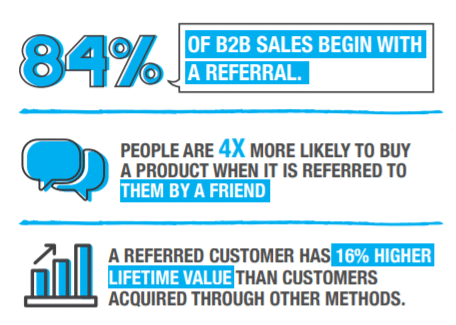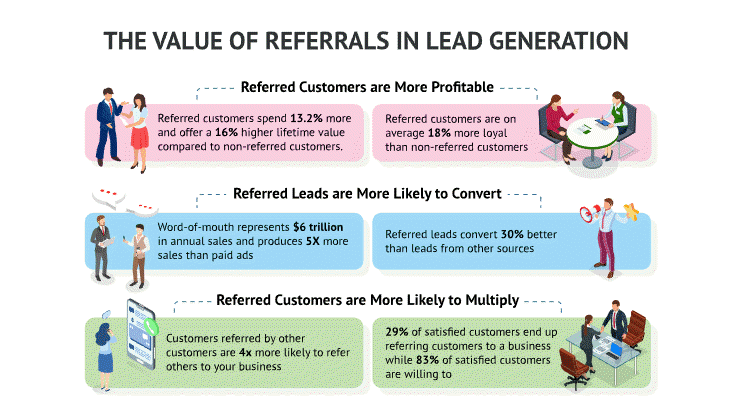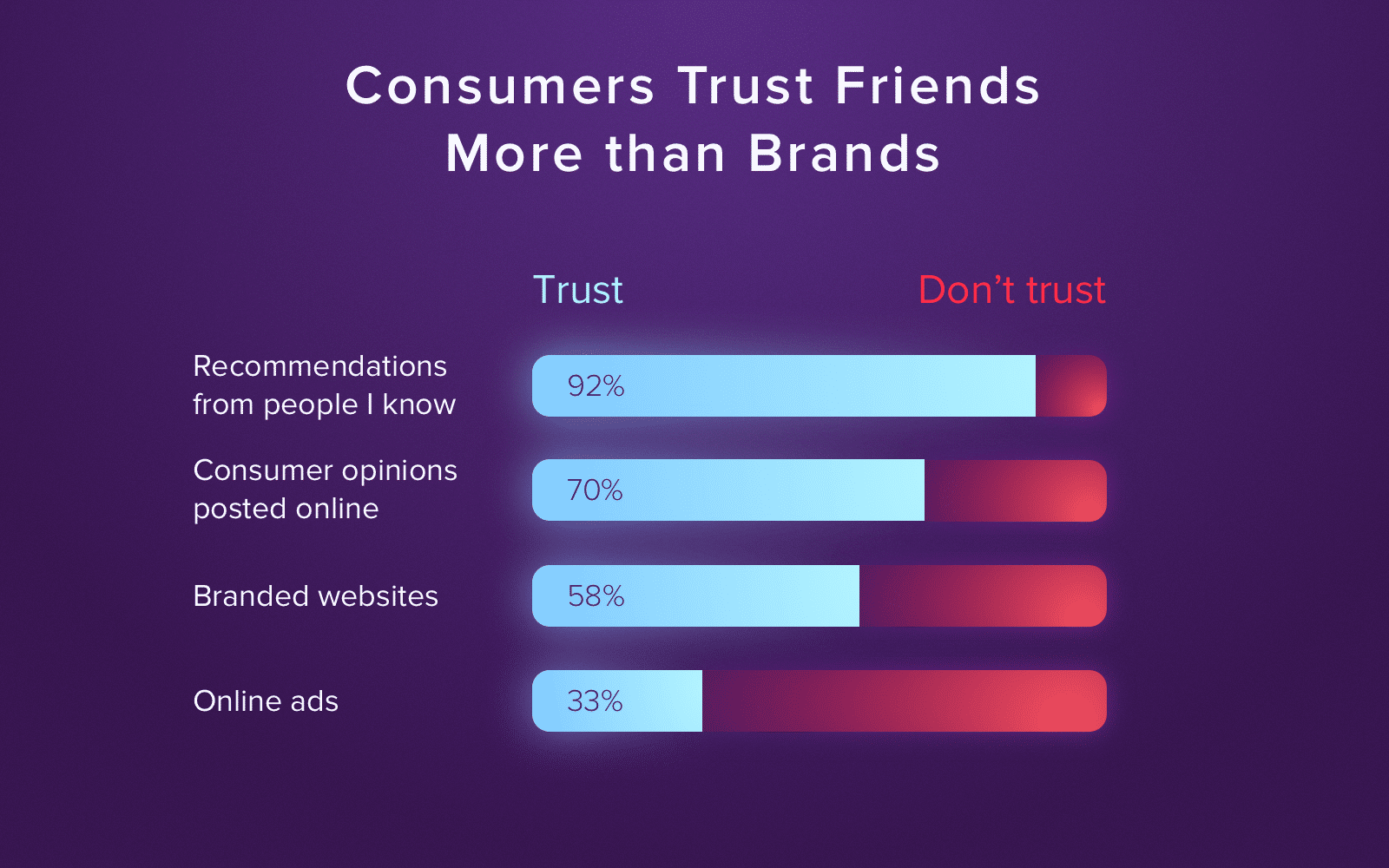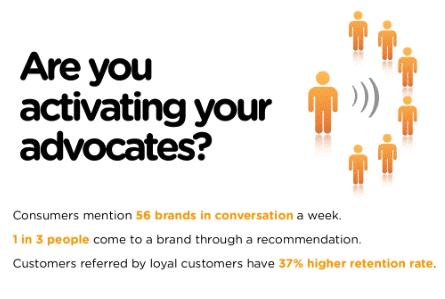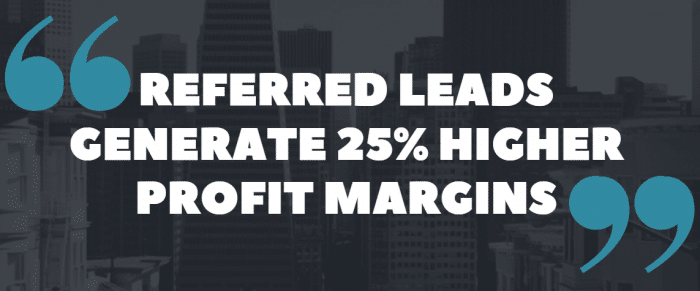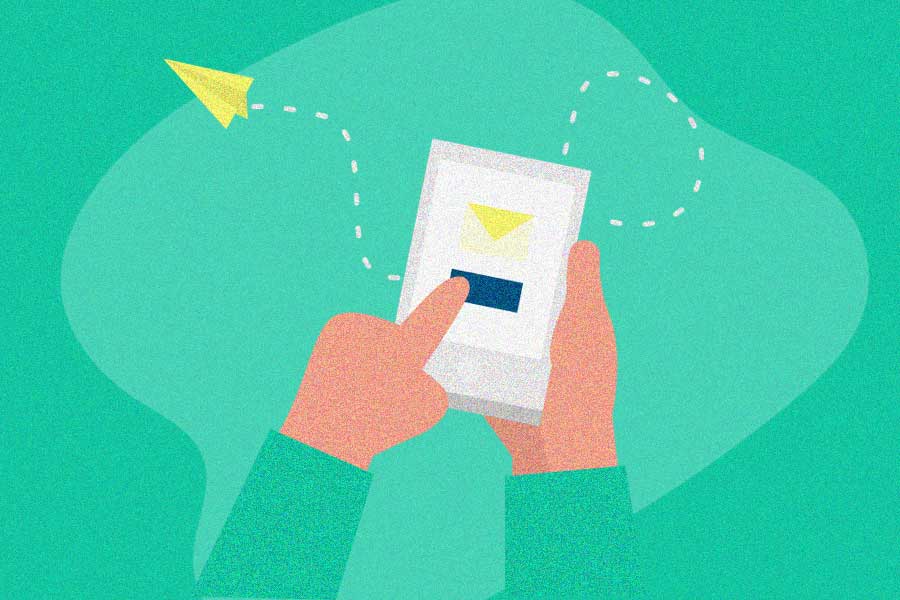Instead of doing all the work and generating leads from scratch, why not have your customers do the marketing for you? Referral programs provide a way to do so.
Many businesses turn to referral marketing because they want to expand their reach and because they know their customers can market to potential leads far more successfully than they can. But this is just one of the benefits of referral programs.
A referral marketing program can help optimize your sales cycle, help you produce quality leads, and take your marketing efforts up a notch, by mobilizing your customers’ trusted voices. Plus, starting a referral program is easier than using most other marketing methods, and often generates a better ROI.
In fact, Nielsen found that people are four times more likely to buy when referred by a friend, because they trust their friend’s word so highly.
As you’ll see, the benefits of referral marketing are incredible. Today, we’ll take a deep dive into the most notable benefits of referral programs, to show why you shouldn’t sleep on this marketing strategy for your business:
1. Grows and tracks word of mouth
Marketers want more leads, and this happens through word of mouth. Referral marketing provides scalability for this to happen.
A referral marketing campaign helps you reach a large audience that you might not otherwise be able to reach, all thanks to the power of word of mouth recommendations from happy customers.
The Word of Mouth Marketing Association (WOMMA, part of the Association of National Advertisers) mentions that in the United States, there are about 2.4 billion brand-related conversations a day.
And word of mouth is so powerful because it brings in new customers. It’s that personal recommendation for your business that acts as one of the best advertisements and builds trust.
But not all customers recommend a business, even when they’re satisfied – Texas Tech reports that, although 83% of customers are willing to refer friends after a positive experience with your brand, only 29% actually do. They need a motivating reminder to share, which a referral program provides with timely messages and attractive rewards.
Plus, without a way to mobilize and measure these recommendations, word of mouth can be unpredictable and hard to track.
That’s where a referral program, created with referral software, comes in. It not only encourages customers to recommend you via automation, but also tracks every single referral they send thanks to a unique referral link.
2. Attracts warm, targeted leads through trust
Because so many ads compete for consumers’ eyes, people are tired of them and tend to tune them out. But an authentic recommendation from a friend who’s already tried a product or service can easily cut through all the noise.
According to Nielsen, 92% of consumers trust personal recommendations more than any advertising or messaging that comes directly from brands.
Brands are often brought up in conversations because people want to share finds with friends who could also benefit.
Alternatively, a person will ask their friend about businesses or products that can help solve a problem they have, which leads to a recommendation. For example, after a neighbor talks to you about needing a good landscaper, you might recommend a landscaping business that you had a great experience with. Thus, you’ve likely sent that landscaping company someone in their target audience, who is a qualified lead.
In most cases, a person will refer someone who they think will want what you’re offering, will be interested, and will move forward with a purchase (especially when there’s a reward on the line). Voila, a qualified lead, who has been primed to trust you since you were recommended from a reliable source.
These types of leads have higher conversion rates (meaning they are more likely to become customers). They also tend to spend more once they buy.
3. Is a pay-per-performance channel
Even though it’s best practice to offer an incentive for referrals, what you spend on your referral program is directly tied to results you bring in.
After paying a one-time fee for referral software, you’ll only pay per performance. This means that your customers can share and promote your business all over, but you’ll only give them rewards when their referred friends end up purchasing from you. Thus, you’ll always have a positive ROI.
And since this is a performance-based channel, ROI and other metrics are easily available (especially if you’re tracking via software).
4. Brings benefits of a paid, owned, and earned channel
Combining paid, owned, and earned media channels is vital for any marketing strategy. A referral program is one of the few marketing channels that counts as a paid, owned, and earned strategy all on its own.
- You own the channel, so you have complete control over it and can easily measure results
- Referral programs prompt word-of-mouth: earned media that can result in viral growth (we’ll cover this in more detail below)
- By “paying” customers to recommend you via referral rewards, you encourage repeated sharing
5. Multiplies loyal customers
It’s a lot easier to gain and keep a lead through your customer’s inner circles than it is to acquire a single new customer. Since a referral creates a sense of trust, that can quickly create loyal customers.
In fact, referred customers are proven to stay with your business longer than other types of customers, as explained by the American Marketing Association. This increases your customer retention rate and your average customer lifetime value.
- The Wharton School of Business found that referred customers have a 16-25% higher customer lifetime value.
- And according to Deloitte, referred customers are 37% more likely to remain loyal to your business.
Not only are leads more prone to staying loyal, but your referring customer is too. If a referral reward can be applied towards a future purchase, existing customers now have an incentive to purchase from you more in the future, and possibly even refer you to friends more often.
6. Lets you meet leads where they are
Referral programs let customers share your brand on the channels they already use to communicate with friends, so it’s an easy way to find and reach potential customers.
With the help of a click-to-copy referral link, your existing customers can easily share your brand anywhere they’re talking with their peers. Most referral software also facilitates direct sharing via email and multiple social media platforms.
Social media sharing is especially powerful, as that’s where people naturally share things they find exciting or cool with their network. As reported by HubSpot, 71% of consumers are more likely to purchase a product or service after a social media referral.
7. Encourages viral growth
Although your referral program may not provide as much growth as the powerhouse Dropbox and Morning Brew referral programs, it still has the potential to create a viral loop that can rapidly grow your business.
How does this cycle work? After customers refer their friends to your business, and those friends become new customers themselves, those friends are likely to refer their own peers.
In fact, referred customers are three times more likely to refer someone else. Many of them want to earn referral rewards themselves, and want to pay it forward by telling others about their experience (since they found out about you through a referral).
Plus, if you combine referral marketing and social media, and let customers make referrals via their favorite social networks, these referrals will reach many potential customers at once. If several people see that social referral, become customers, and refer their own friends on social, this can quickly create exponential growth!
8. Creates a new channel for engagement
Referral marketing programs enable you to find out which customers will speak on your behalf. This lets you build the perfect opportunities to remarket and promote your business. But how does this create a channel for engagement to occur?
As a brand, you most likely already send emails and newsletters to your customers and share your content on social media. Referral marketing gives you another reason to use and share on these platforms, making it a whole lot easier to ask for referrals.
You can also engage with customers by giving shout-outs on social media, and praising them when their referred friends become new customers. A little public praise can be the exact engagement a customer needs in order to keep referring.
Referral programs also remind customers why they love your brand, since they’re encouraged to share this love with others. And when happy customers feel like they’re contributing to your success, they’ll be proud to share your brand and more likely to engage with you.
9. Brings in new customers at a lower cost
Because referral marketing relies on word of mouth and your existing customers, your marketing costs can be cut down exponentially. Referral programs have a much lower customer acquisition cost (CAC) compared to most other marketing methods.
How is that possible? Well, it’s a lot less expensive pushing marketing efforts towards your existing customer base than it is to market to new customers. Not to mention, a customer’s recommendation of you is much more persuasive than any ad you could pay for.
Think about these aspects.
- An existing customer is more likely to open your emails than a potential customer is
- A potential customer is more likely to open and act on messages from their friends vs. messages from your brand.
- You can promote your referral program through existing marketing efforts
- An incentive is your primary cost (and you can easily control how much you spend on the incentive)
- As covered above, you only pay when you see results
It’s also worth noting that referrals can produce higher profit margins. The Wharton School’s study (of more than 10,000 participants, over 33 months) found that referred leads generate 25% higher profit margins compared to leads acquired by other channels.
10. Helps you identify your best advocates
Thanks to the tracking features of a referral program, it’s easy to see which customers are your best advocates. This way, you can further reward your best customers if you choose, with exclusive VIP incentives. Or, you can ask these customers to represent your brand more formally, as affiliates, referral partners or effective brand ambassadors.
Strategies for starting a referral program
Now that you know the benefits of referral programs, how to start one? Follow these best practices to set a referral program up for success:
- Know who to ask for referrals, and when you should ask. It’s best to ask when a customer is happiest.
- On the referral program page, make sure customers can quickly understand your program. Cover the essentials, but keep your explanation short and sweet.
- Let customers refer their friends in multiple ways, including via email, social media, and a click-to-copy referral link.
- Offer enticing referral rewards that customers want to earn.
- Reward both the referring customer and their referred friend whenever a friend makes a purchase.
- Promote your referral program on a variety of channels.
- Use referral software to easily track your referral program’s ROI.
Wrapping up
To summarize, there are many benefits of referral programs. You can boost your marketing ROI and drive conversions with referral marketing. Not to mention, it’s easy to build up your social proof and social currency through the power of trust, develop an engaging way to communicate with customers in multiple channels, and hit right on your target market.
And since your customers do the marketing for you once you’ve set up your program, this gives you the time and energy to focus on what you do best.
Are you enticed by these benefits and ready to start a customer referral program? Learn more about how to start one in our ultimate referral program guide, or check out the advantages of using our own referral program software.

